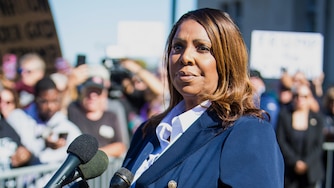Holly Barnes showed up to her court hearing Wednesday afternoon wearing a striped green crocheted sweater. Jennifer Alexander, the inaugural judge of Anne Arundel County’s first mental health court, noticed.
“Did you make it?” she asked.
Barnes had told her in July she had taken up crocheting, bringing a “beautiful” blue striped blanket to show her — “which I was amazed at,” the judge said, “but the sweater really takes the cake.”
When Barnes was charged with malicious destruction of property in 2023, her case was initially treated as a criminal case. But court officials realized that Barnes, who was diagnosed with schizophrenia, needed a holistic approach. Her case, Alexander said, became sort of a “special project,” with the courts setting in motion a process to establish the county’s first mental health court, an addition to a growing roster of problem-solving courts.
“It’s long overdue,” Alexander said at a press conference before the first docket, “But I’m so glad that we’re here.”
What is different about the new mental health court program is that it pairs judicial oversight, where the judge holds people accountable, with care from clinical providers, employment assistance, training opportunities and transportation through the county’s Crisis Intervention Team. Maryland has more than 60 problem-solving courts in jurisdictions throughout the state, including mental health courts in Baltimore City, Baltimore County and a handful of other counties.
District Administrative Judge Shaem Spencer said the mental health court program will be a collaboration between the county’s mental health agency, a public defender and the Office of the State’s Attorney for Anne Arundel County. The court, Spencer said, wants to divert some people away from jail and provide them with the resources they need.
Jen Corbin, director of the county mental health agency’s Crisis Response System, said workers will drive people to appointments, help them get the benefits they need and make sure they report back to court. Her team has already been doing this work, she said, but establishing the court will link more people to them.
“It’s the ability to get all of the services they need under one roof,” she said.
Addressing a roomful of judicial colleagues and members of the county’s Crisis Response System, Supreme Court Chief Justice Matthew Fader said people with untreated mental health conditions often cycle through the criminal justice system. They seldom get the help they need to break the chain, he said, and courts, jails and prisons don’t effectively address mental health conditions.
“The problems can be much more effectively treated outside, earlier and in more therapeutic environments,” he said.
District Court of Maryland Chief Judge John Morrissey said establishing the new court acknowledges that mental health conditions are medical issues, not cause for crime. Recognizing this builds hope for those who have mental health issues.
“The establishment of mental health courts, in my opinion, is a beacon of hope,” he said.
Workers with the Crisis Response System, a program within the county’s mental health agency, accompanied those set to appear on the court’s first docket. Workers walked them to their attorney, standing a few feet away as the judge addressed them.
Shannon Stevenson was on a waitlist for a therapist and agreed to come back to court for monthly check-ins, a Crisis Response System worker said in court. She was slowly returning to work after being charged with a misdemeanor over the summer.
“Great,” said the judge, who then turned to Stevenson. “You should be very proud of yourself. We are all very proud of you.”
She repeated herself as she went through the docket, asking those who were set to appear if they were doing OK. She said earlier that day it was OK if they were not.
As for those who failed to appear in court, the judge asked the attorney to keep reaching out.
Of one person, the judge said, “We are not gonna give up on her.”




Comments
Welcome to The Banner's subscriber-only commenting community. Please review our community guidelines.